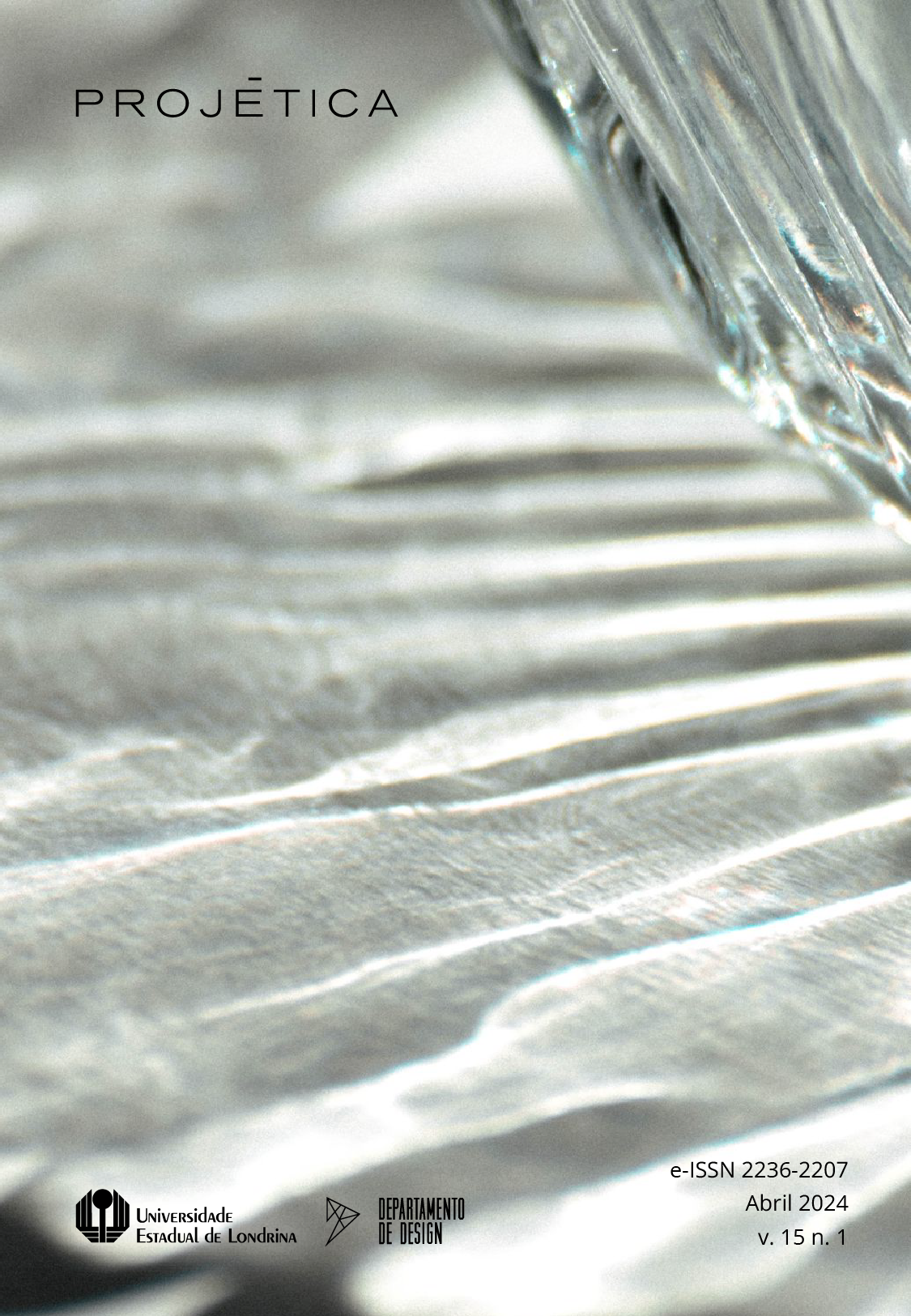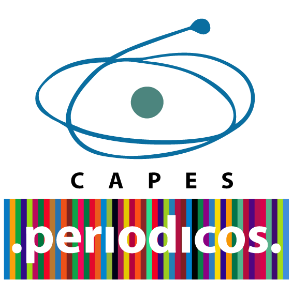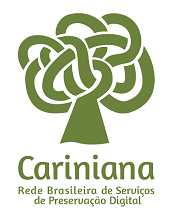Processo de criação na indústria criativa
relato da criação de jogo educacional no Minecraft Education
DOI:
https://doi.org/10.5433/2236-2207.2024.v15.n1.47859Palabras clave:
jogos educativos, Minecraft Education, aprendizado por jogosResumen
O presente artigo objetiva relatar o processo de design de um serious game de literatura e literacia, destinado a uma turma de quinze alunos de até seis anos, com a obra O Mágico de Oz sendo tomada como referência. Apoiou-se em metodologia de relato ex post facto. Os achados da experiência podem contribuir para o design de jogos educacionais de literatura projetados a crianças de ensino primário ressaltando a importância dos fatores de assimilação e familiaridade, abordagem a priori de conteúdo instrucional, cooperação entre pares e dosagem de grau de facilidade de uso.
Descargas
Citas
BILE, Alessandro. Development of intellectual and scientific abilities through game-programming in Minecraft. Education and Information Technologies, Dordrecht, NL, v. 27, n. 3, p. 7241-7256, 2022. Disponível em: https://link.springer.com/10.1007/s10639-022-10894-z. Acesso em: 1 mar. 2024. DOI: https://doi.org/10.1007/s10639-022-10894-z
BOITO, Paula; SILVA, Juliano T.; Jogo Minecraft como aliado no processo de ensino e aprendizagem da geometria espacial. Revista Brasileira de Ensino de Ciência e Tecnologia, Ponta Grossa, PR, v. 13, n. 3, p. 75-92, 2020. Disponível em: https://periodicos.utfpr.edu.br/rbect/article/view/9947. Acesso em: 1 mar. 2024. DOI: https://doi.org/10.3895/rbect.v13n3.9947
BOYLE, Elizabeth; CONNOLLY, Thomas M.; HAINEY, Thomas. The role of psychology in understanding the impact of computer games. Entertainment Computing, Kyoto, Japan, v. 2, n. 2, p. 69-74, 2011. Disponível em: https://linkinghub.elsevier.com/retrieve/pii/S1875952110000200. Acesso em: 1 mar. 2024. DOI: https://doi.org/10.1016/j.entcom.2010.12.002
BROWN, Emily; CAIRNS, Paul A. A grounded investigation of game immersion. In: CONFERENCE ON HUMAN FACTORS IN COMPUTING SYSTEMS - CHI, 2004, Vienna, Austria, 2004. Conference paper […]. Vienna: CHI, 2004. DOI:10.1145/985921.986048 DOI: https://doi.org/10.1145/985921.986048
BRUNER, Jerome S. Toward a theory of instruction. Cambridge: Belknap Press, 1966.
CHENG, Meng-Tzu; SHE, Hsiao-Ching; ANNETTA, Leonard. Game immersion experience: its hierarchical structure and impact on game-based science learning. Journal of Computer Assisted Learning, Oxford, GB, v. 31, n. 3, p. 232-253, 2015. Disponível em: https://www.researchgate.net/publication/261603212_Game_immersion_experience_Its_hierarchical_structure_and_impact_on_game-based_science_learning. Acesso em: 1 mar. 2024. DOI: https://doi.org/10.1111/jcal.12066
COLBY, Rebekah Shultz; COLBY, Richard. A pedagogy of play: integrating computer games into the writing classroom. Computers and Composition, New York, US, v. 25, n. 3, p. 300-312, 2008. Disponível em: https://linkinghub.elsevier.com/retrieve/pii/S8755461508000406. Acesso em: 1 mar. 2024. DOI: https://doi.org/10.1016/j.compcom.2008.04.005
CRESWELL, John W. Research design: qualitative, quantitative, and mixed methods approaches. 4th ed. London: SAGE Publications, 2013.
CSIKSZENTMIHALYI, Mihaly. Flow and foundations of positive psychology. New York: Springer, 2014. DOI: https://doi.org/10.1007/978-94-017-9088-8
DALE, Edgar. Audiovisual methods in teaching. 3rd ed. New York: Holt, Rinehart & Winston, 1969.
DE-MARCOS, Luis; DOMÍNGUEZ, Adrián; SAENZ-DE-NAVARRETE, Joseba, PAGÉS, Carmen. An empirical study comparing gamification and social networking on e-learning. Computers in Human Behavior, Philadelphia, PA, v. 75, n. 1, p. 82-91, 2014. Disponível em: https://www.sciencedirect.com/science/article/abs/pii/S036013151400030X. Acesso em: 1 mar. 2024. DOI: https://doi.org/10.1016/j.compedu.2014.01.012
DING, Lu. Applying gamifications to asynchronous online discussions: a mixed methods study. Computers in Human Behavior, Philadelphia, PA, v. 91, n. 1, p. 1-11, 2019. Disponível em: https://www.sciencedirect.com/science/article/abs/pii/S0747563218304631. Acesso em: 1 mar. 2024. DOI: https://doi.org/10.1016/j.chb.2018.09.022
GEE, James Paul. What videogames have to teach us. New York: Palgrave Macmillan, 2003.
JAGUŠT; Tomislav; BOTIČKI, Ivica; SO, Hyo-Jeong. Examining competitive, collaborative and adaptive gamification in young learner’s math learning. Computers & Education, New York, US, v. 125, n. 1, p. 444-457, 2018. Disponível em: https://www.sciencedirect.com/science/article/abs/pii/S0360131518301659. Acesso em: 1 mar. 2024. DOI: https://doi.org/10.1016/j.compedu.2018.06.022
JARVOLL, Agnieszka B. I’ll have everything in diamonds!" Students experiences with Minecraft at school. Studia Paedagogica, Salamanca, ES, v. 23, n. 4. p. 68-89, 2018. Disponível em: https://ntnuopen.ntnu.no/ntnu-xmlui/bitstream/handle/11250/2591251/Jarvoll.pdf?sequence=2&isAllowed=y. Acesso em: 1 mar. 2024. DOI: https://doi.org/10.5817/SP2018-4-4
KOSTER, Raph. A theory of fun for game design. Scottsdale: Paraglyph Press, 2005.
LANDERS, Richard N.; BAUER, Kristina; CALLAN, Rachel C.; ARMSTRONG, Michael B. Psychological theory and the gamification of learning. In: REINERS, Torsten; WOOD, Lincoln C. Gamification in education and business. Cham: Springer International Publishing, 2015. Chap. 9, p. 165-186. DOI:10.1007/978-3-319-10208-5_9 DOI: https://doi.org/10.1007/978-3-319-10208-5_9
MCTIGUE, Erin M.; UPPSTAD, Per Henning. Getting serious about serious games: best practices for Computer Games in reading classrooms. The Reading Teacher, Newark, DE, v. 72, n. 4, p. 453-461, 2019. Disponível em: https://onlinelibrary.wiley.com/doi/10.1002/trtr.1737. Acesso em: 1 mar. 2024. DOI: https://doi.org/10.1002/trtr.1737
MEDEIROS FILHO Marisardo; BENÍCIO, Ian V.; CAMPOS, Fabio; NEVES, André, M. M. A importância da prototipação no design de games. In: SIMPÓSIO BRASILEIRO DE JOGOS E ENTRETENIMENTO DIGITAL (SBGAMES), 12., 2013, São Paulo,SP. Anais [...]. São Paulo: Mackenzie, 2013. p. 312-318.
MENDES, Thiago; SILVA, Régio Pierre da. Games e educação: diretrizes de projeto para jogos voltados à aprendizagem. Lisboa: Novas Edições Acadêmicas, 2014.
NAZRY, Nazrina N. M.; ROMANO, Daniela M. Mood and Learning Experience in Navigation-based serious games. Computers in Human Behavior, Philadelphia, PA, v. 73, n. 1, p. 596-604, 2017. Disponível em: https://discovery.ucl.ac.uk/id/eprint/10046393/. Acesso em: 1 mar. 2024. DOI: https://doi.org/10.1016/j.chb.2017.03.040
PAPANASTASIOU, George P.; DRIGAS, Athanasios S.; SKIANIS, Charalabos. Serious games in preschool and primary education: benefits and impacts on curriculum course syllabus. International Journal of Emerging Technologies in Learning (iJET), Waynesville, NC, v. 12, n. 1, 2017. Disponível em: http://online-journals.org/index.php/i-jet/article/view/6065. Acesso em: 1 mar. 2024. DOI: https://doi.org/10.3991/ijet.v12i01.6065
PIAGET, Jean W. L'epistemologie et ses variétés. In: PIAGET, Jean W (org.). Logique et connaissance scientifique. Paris: Galimard, 1967.
PINHEIRO, Cristiano M. P.; KUHN, Norberto J.; CZRNHAK, Thomás. Criatividade, ensino e Minecraft: a adoção de estratégias lúdicas para o ensino digital em tempos pandêmicos. Anais do Interprogramas Secomunica, Brasília, DF, v. 5., p. 1-25, 2021.
PRIETA, Fernando De la, MASCIO, Tânia Di; GENNARI, Rosella; MARENZI, Ivana; VITTORINI, Pierpaolo. User-centred and evidence-based design of smart games for poor text comprehenders: the TERENCE experience. International Journal of Technology Enhanced Learning, Geneva, SW, v. 6, n. 6, 2014. Disponível em: http://www.inderscience.com/link.php?id=68350. Acesso em: 1 mar. 2024. DOI: https://doi.org/10.1504/IJTEL.2014.068350
PRODANOV, Cleber C.; FREITAS, Ernani C. Metodologia do trabalho científico: métodos e técnicas da pesquisa e do trabalho acadêmico. 2. ed. Novo Hamburgo: Feevale, 2013.
RYAN, Richard M.; DECI, Edward L. Self-determination theory and the facilitation of intrinsic motivation, social development, and well-being. American Psychology Association, Washington, DC, v. 55, n. 1, p. 68-78, 2000. Disponível em: https://selfdeterminationtheory.org/SDT/documents/2000_RyanDeci_SDT.pdf. Acesso em: 1 mar. 2024. DOI: https://doi.org/10.1037//0003-066X.55.1.68
SHUTE, Valerie; RAHIMI, Seyedahmad; SMITH, Ginny; KE, Fengfeng; ALMOND, Russell; DAI, Chih-Pu; SUN, Chen. Maximizing learning without sacrificing the fun: Stealth assessment, adaptivity and learning supports in educational games. Journal of Computer Assisted Learning, Hoboken, NJ, v. 37, n. 3, p. 127-141, 2021. Disponível em: https://onlinelibrary.wiley.com/doi/10.1111/jcal.12473. Acesso em: 1 mar. 2024.
THOMAS, George C. Research methodology and scientific writing. 2nd ed. Cham: Springer International Publishing; 2021. DOI: https://doi.org/10.1007/978-3-030-64865-7
VYGOTSKY, Lev S. Imaginação e Criatividade na Infância. Lisboa: Dinalivro, 2012.
VYGOTSKY, Lev S. Thought and language. 2. ed. Cambridge: MIT Press, 1986.
WANG, Yichuan; RAJA, Pramod; SANKAR, Chetan S.; RAJU, P. K. Let them play: the impact of mechanics and dynamics of a serious game on student perceptions of learning engagement. IEE Transactions on Learning Technologies, Piscataway, NJ, v. 10, n. 4, p. 514-525, 2017. Disponível em: https://ieeexplore.ieee.org/document/7782404. Acesso em: 1 mar. 2024. DOI: https://doi.org/10.1109/TLT.2016.2639019
ZAINUDDIN, Zamzami; WAH CHU, Samuel Kai; SHUJAHAT, Muhammad; PERERA, Corinne Jacqueline. The impact of gamification on learning and instruction: A systematic review of empirical evidence. Educational Research Review, Amsterdam, NL, v. 30, Jun. 2020. DOI: https://doi.org/10.1016/j.edurev.2020.100326. Disponível em: https://www.sciencedirect.com/science/article/abs/pii/S1747938X19301058. Acesso em: 1 mar. 2024. DOI: https://doi.org/10.1016/j.edurev.2020.100326
ZENG, Jialing; PARKS, Sophie; SHANG, Junjie. To learn scientifically, effectively, and enjoyably: a review of educational games. Human Behavior and Emerging Technologies, London, UK, v. 2, n. 2, p. 186-195, 2020. Disponível em: https://onlinelibrary.wiley.com/doi/10.1002/hbe2.188. Acesso em: 1 mar. 2024. DOI: https://doi.org/10.1002/hbe2.188
ZHONGGEN, Yu. A meta-analysis of use of serious games in Education over a decade. International Journal of Computer Games Technology, London, UK, v. 2019, p. 1-8, 2019. Disponível em: https://www.hindawi.com/journals/ijcgt/2019/4797032/. Acesso em: 1 mar. 2024. DOI: https://doi.org/10.1155/2019/4797032
Descargas
Publicado
Cómo citar
Número
Sección
Licencia
Derechos de autor 2024 Thomás Czrnhak, Cristiano Max Pereira Pinheiro, Thomas Mohr, Marta Rosecler Bez

Esta obra está bajo una licencia internacional Creative Commons Atribución 4.0.
Projética está licenciada sob a Creative Commons Attribution CC-BY 4.0 International. Os autores detém os direitos autorais e concedem à revista o direito de exclusividade de primeira publicação.
Os autores dos trabalhos aprovados autorizam Projética a, após a publicação, ceder seu conteúdo para reprodução em indexadores de conteúdo, bibliotecas virtuais e similares.
Os autores assumem que os textos submetidos à publicação são de sua criação original, responsabilizando-se inteiramente por seu conteúdo em caso de eventual impugnação por parte de terceiros. As opiniões emitidas pelos autores dos artigos são de sua exclusiva responsabilidade.
A revista se reserva o direito de efetuar, nos originais, alterações de ordem normativa, ortográfica e gramatical, com vistas a manter o padrão culto da língua e a credibilidade do veículo. Respeitará, no entanto, o estilo de escrever dos autores. Alterações, correções ou sugestões de ordem conceitual serão encaminhadas aos autores, quando necessário. Nesses casos, os artigos, depois de adequados, deverão ser submetidos a nova apreciação. As provas finais não serão encaminhadas aos autores.











